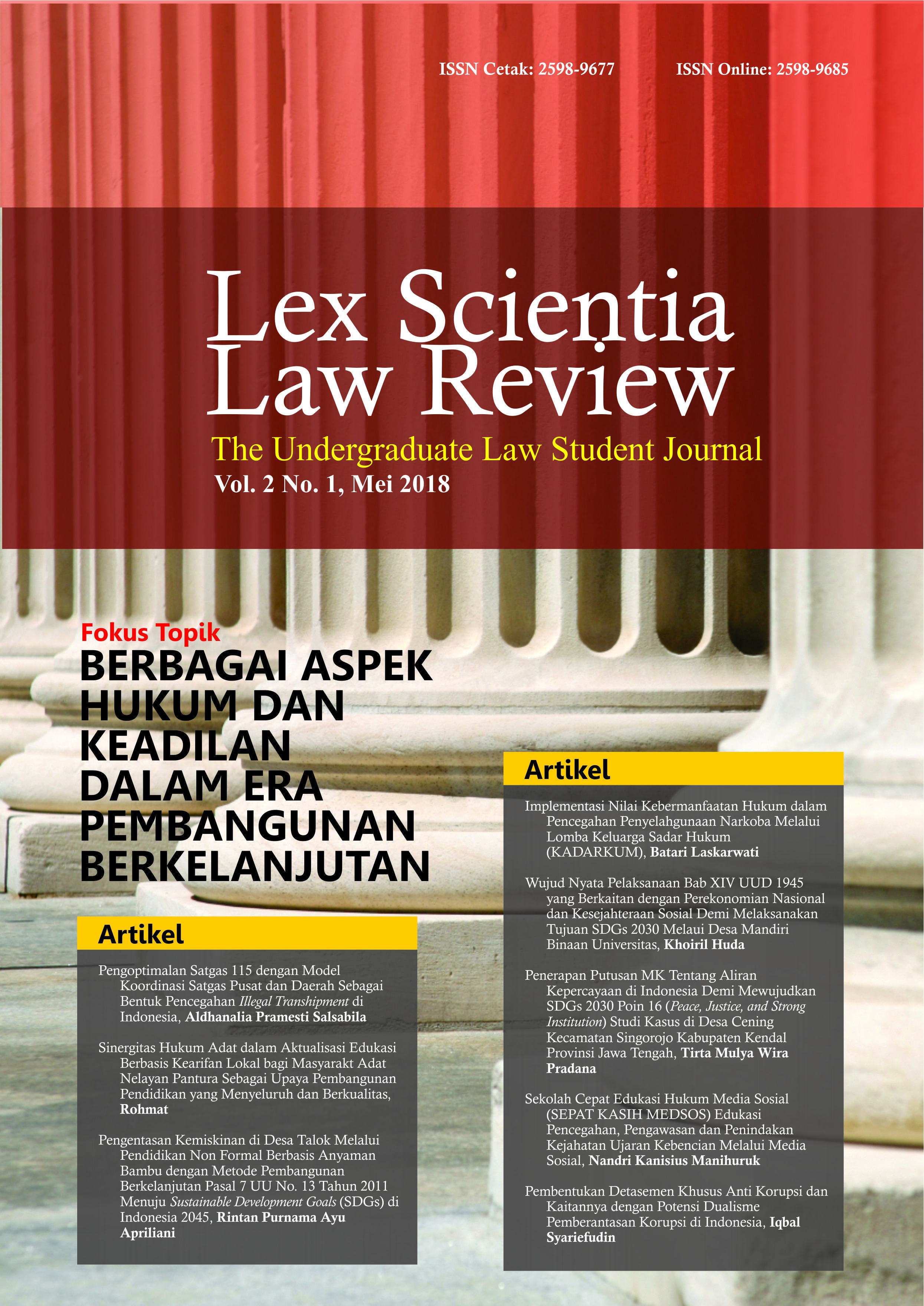Formation of Special Anti-Corruption Detachments and its relation to the potential for dualism in the eradication of corruption in Indonesia Pembentukan Detasemen Khusus Anti Korupsi dan Kaitannya dengan Potensi Dualisme Pemberantasan Korupsi di Indonesia
Main Article Content
Abstract
The Corruption Eradication Commission is a state institution that in carrying out its duties and authority is independent and free from the influence of any power. other law enforcement agencies such as the police, the prosecutor's office is still not optimal in efforts to eradicate corruption in Indonesia, the Corruption Eradication Commission is arguably a fresh air in efforts to eradicate corruption, it is expected that the Corruption Eradication Commission becomes an independent institution in eradicating corruption, there is no intervention from anywhere , so that in its implementation it is indiscriminate, professional, intensive, and realize the expectations of the community to suppress the smallest possible criminal acts of corruption.
Article Details
All writings published in this journal are personal views of the authors and do not represent the view of this journal and the author's affiliated institutions. Authors retain the copyrights under this license, see our copyrights notice.
References
Awaludin, Arif. "Ideologi Etis Penyingkap Korupsi Birokrasi." Pandecta Research Law Journal 11, no. 2 (2016): 189-201.
Djaja, Ermansyah. Memberantas Korupsi Bersama KPK. (Jakarta: Sinar Grafika, 2008).
Endarto, Endarto. “Kendala KPK dalam Pemberantasan Korupsi di Indonesia”. Jurnal Lingkar Widyaiswara 1, no. 2 (2014): 6-15.
Kusuma, Fransiscus Dea Anggara . Kewenangan Kepollisian dan Kejaksaan dalam Penyidikan Tindak Pidana Korupsi(Studi Kasus PT ASABRI). Thesis. (Yogyakarta: Universitas Atma Jaya Yogyakarta, 2015).
Muhtada, Dani. "The Prospects for Public Management Reform in Indonesia." JILS (Journal of Indonesian Legal Studies) 2, no. 2 (2017): 145-154.
Nisa, Rahmania Fakhrun. "Corruption Relationship with the Values in Sila Pancasila: A Reflection of Law Enforcement." Jurnal Scientia Indonesia 2, no. 2 (2016).
Satria, I. Wayan Yuda, I. Wayan Suardana, and Ida Bagus Surya Darmajaya. "Kewenangan Komisi Pemberantasan Korupsi (KPK) Dalam Upaya Pemberantasan Tindak Pidana Korupsi Di Indonesia." Kerthasemaya 1, no. 1 (2013): 1-18.
Soehardi, S.A. Polisi dan Profesi .(Semarang: PD.PP Polri Jawa Tengah, 2008).
Sumardiana, Benny. "Reversal Evidence Policy on Corruption as Specialization of Criminalization." IJCLS (Indonesian Journal of Criminal Law Studies) 2, no. 2 (2017): 155-167.
Widayati, Dewi Kuncoro, and Rehnalemken Ginting. "Kinerja Komisi Pemberantasan Korupsi Dalam Pemberantasan Tindak Pidana Korupsi Berdasarkan Undang-Undang Nomor 30 Tahun 2002 Tentang Komisi Pemberantasan Tindak Pidana Korupsi." Recidive 3, no. 2 (2014): 199-208.
Zaidan, Muhamad Ali. "Sociological Approach to Eradication Corruption In Indonesia (Alternative to Imprisonment)." Pandecta Research Law Journal 12, no. 1 (2017): 28-38.
